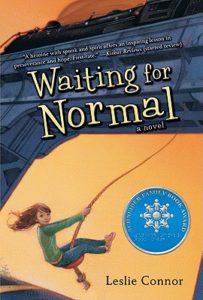As school winds down and thousands of children are about to be sent out into the world to make the most of their summer breaks, they need to know about good books! Books will not help fill those lazy hours, but enhance them! Turn them into dreams! Adventure! Suspense! Romance! Humor! ALL RISE FOR THE HONORABLE PERRY T. COOK by Leslie Connor is one such book. Eleven-year-old Perry is torn from the only “family” he has known in the correctional facility where his mother has been – wrongly – held for his entire life, and sent to live with a foster family. It’s enough to break his young heart. As unorthodox as Perry’s situation may be, his is the story shared by too many young people today: displacement, hopelessness, loss of a loved one. Yet does Perry go quietly? You bet he doesn’t. And the family that takes him in isn’t any more perfect than the one he left. Which everyone in the story finally comes to learn, because Perry’s as brave as he is and determined to show them.
I found out why this book is as effective as it is when I talked to author Leslie Connor. The book has heart because that’s where Connor writes from:
ReaderKidZ :The moment I read the premise of your book, I was hooked. How did you come up with the idea of a boy who was raised in a correctional institute? I imagine you had to do a ton of research.
LC: I had a “prison story” file going for a few years—basically a collection of articles and stats. Situations were plenty, but it took me a while to land on the child-centered element that I was looking for. Eventually, my research pointed to how hard it is for children to get to facilities to visit incarcerated parents, and how difficult it is to parent a child while serving out a sentence. Though the story is “Big Fiction” (some people would say “far fetched”) I kept my aim at that emotional truth so I wouldn’t lose the reader’s trust. My theory: You’ll come along with me, if I pull you by your very heart.
 ReaderKidZ: The “family” Perry has been raised by there, from Big Ed to Warden Daugherty to Miss Sashonna to Mr. Rojas and all the rest, are so wonderful. What were your models for such varied and quirky-yet-empathetic characters?
ReaderKidZ: The “family” Perry has been raised by there, from Big Ed to Warden Daugherty to Miss Sashonna to Mr. Rojas and all the rest, are so wonderful. What were your models for such varied and quirky-yet-empathetic characters?
LC: I read case studies by the dozens, and though none of the real characters or their cases made it into the book, the information provided the launch pad for both. (I’m all about creating composites!) Seeing who is in our prisons and why, especially minimum-security facilities, is where the empathy comes from— and I say so with my fist pressed against my heart. (That hurt!)
ReaderKidZ: Did you visit any real correctional facilities while writing the book?
LC: Only on line, and I think that actually worked in favor of the story since I was inventing so much. Blue River is perhaps a little bit jolly and tidy—at least as seen through Perry’s eyes. But there is a real world effort toward making correctional facilities less bleak—from the daily schedule to the architecture to the paint colors and use of light. I ran with that.
ReaderKidZ: I love Perry’s morning announcement – from his morning news message to the thoughtful, gentle way he begins. It reminded me of Robin William’s “Good Morning, Vietnam.” Does a morning announcement really happen in such a facility?
LC: Not over a public address system, as far I know! But I read about wake-up calls with lights coming on and locks being released, and that general sense that your time is not your own. By the way, I’m pretty sure I thought of “Good Morning Vietnam” as well.
and locks being released, and that general sense that your time is not your own. By the way, I’m pretty sure I thought of “Good Morning Vietnam” as well.
ReaderKidZ: One of my favorite aspects of the book is the fact that the protagonist is a boy. You allow Perry to show emotion and cry and express love in a way that’s rare to show in boy characters or even in boys. Did you consider a girl, or was Perry a boy in your mind from the start?
LC: Boy from the start, and pretty fully formed in regard to emotions. I knew who he was from page one. Middle grade characters are really having life done to them. The hardest thing was letting him get mad and show that anger.
ReaderKidZ: When Thomas VanLeer comes to take Perry away, it’s heart-breaking. I couldn’t help but wonder whether the State could do such a thing as easily as it seemed to happen in the book. Are there real cases in which such a thing happened?
LC: Well, of course there are no real cases of an eleven-year-old boy being raised in a prison, as far as I know, so no! I researched first person accounts from kids going into foster care. If they are old enough, they are informed beforehand, as Perry was. But can they ever feel ready for such a change? There is, of course, that moment when it is simply time to go. So again, an emotional truth exists, and the reader has to observe it.
ReaderKidZ:You could have made the Van Leer family the model of a “normal, happy” family, but you didn’t. The VanLeers are decidedly complicated, with unhappy undercurrents. What are you trying to say in making them this way?
 LC: I’m interested in the changing composition of the American family; we have plenty of new “normal” out there, and I think letting that sit on the page is important in literature for young people; this is how they will see their own lives mirrored in the storyline. I was also drawing that parallel between Blue River and the VanLeer home—the two homes Perry experienced—and highlighting the fact that every “house” is full of complicated people who often struggle to get along.
LC: I’m interested in the changing composition of the American family; we have plenty of new “normal” out there, and I think letting that sit on the page is important in literature for young people; this is how they will see their own lives mirrored in the storyline. I was also drawing that parallel between Blue River and the VanLeer home—the two homes Perry experienced—and highlighting the fact that every “house” is full of complicated people who often struggle to get along.
ReaderKidZ: The reader starts out detesting Thomas VanLeer and ends up having great empathy for him. How did you manage this?
LC: That’s hard to answer. I made sure to let that character act out both his best intentions and his imperfections right before Perry’s eyes. Zoey does some coming around in the end in regard to her stepfather, too. That allowed her character to show growth in understanding.
ReaderKidZ: Perry’s investigation into the crime his mother supposedly committed, and the subsequent trial, could have felt contrived and convenient, but didn’t. First of all, congratulations. Secondly, how did you come up with this as an ending? Did you consider alternate endings?
First of all, thanks. Most fiction has to rely on coincidence to some degree. (I love hearing the root word “coincide” when I say so because that’s what a story is all about.) I suppose fiction must rely on some conveniences too—and the writer does have to be careful that she can sell those. But real life is filled with “can’t believe it!” moments, too. I wondered much of my way through how some of those details would be revealed. At some point a solution just makes sense. For a slice of insider fun, I will say this: there were some actual geographical details about intersections and proximity to Lincoln, NE that happened to work in my favor beautifully. Writers can have “can’t believe it!” moments too.
ReaderKidZ is thrilled to have Leslie Connor here and hope you’ll read her newest book and put it into the hands of as many young readers as you can.










